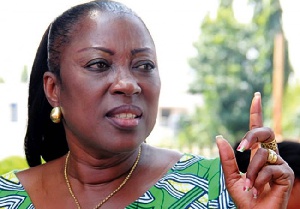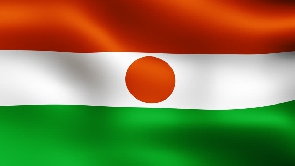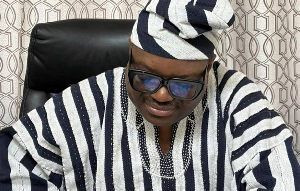The scandalous controversy
In the wake of former Transport Minister Dzifa Attivor’s explosive revelations that the New Patriotic Party (NPP) politically hunted down and eventually jailed some prominent Ewe members of the National Democratic Congress (NDC), a party J.J. Rawlings led at the dawn of the Fourth Republic until Kufuor’s ethnocentric NPP displaced it. Some members of the public have come out to either defend or reject her remarks in very strong language. This is expected.
One school of thought is of the view that her remarks are ethnocentric and likely to inflame inter-ethnic tensions.
This school of thought generally includes members of the NPP and its fan base (supporters), some civil society organizations such as the National Peace Council, some media personalities, entertainers, etc.
The other school of thought, however, holds the view that her statements are in fact true reflections of the political arithmetic of partisan ethnocentrism, the latter generally reflective of the NPP and some of its leading members and spokespersons—prominent examples being Akufo-Addo himself, Yaw Osafo Marfo and Kennedy Agyapong.
This school of thought generally includes the NDC, its outspoken members Asiedu Nketia and Twum Boafo, and the fan base of the NDC. A member of this school of thought put it this way: “Must we wait for them to proceed with the agenda to cripple the base (Ewes) of NDC? ‘No’ is the answer… Hon Dzifa Attivor spoke our mind.”
The irony of this Manichaean duopoly may point to both schools of thought being right to a certain extent.
For one thing, the Kufuor government did clandestinely supervise the prosecution of these Ewe members Madam Attivor mentioned in her controversial remarks. She mentioned these names as part of her general public indictment of Kufuor’s ethnocentric NPP, with Akufo-Addo, Kufuor himself and other leading NPP apparatchiks reaching out to moles planted in the judiciary to carry out this hatchet job for them. It is already in the history books of the popular mind.
That political witch hunt could have had ethnocentric undertones, but this controversial theory has yet to be convincingly demonstrated to be the case beyond a reasonable doubt. We could not care less about absolute certainty. And of course, Kufuor’s ethnocentric NPP also witch-hunted Akans like Kwame Peprah and Sipa Yankey. Madam Attivor also reportedly said the following:
“I want to remind you that it is your vote that will decide if Fifi Kwetey and I will be prosecuted and put behind bars or not.”
Still, many are those who have not forgotten Kufuor’s open display of political ethnocentrism during his two-term presidency, a view which the second school of thought loudly and absolutely represents, no doubt as we see it and also understand it.
Also the first school of thought, for instance, sees some connections between the NPP’s political witch hunt of those prominent NDC members of Ewe extraction, allegedly, and those murdered Akan generals and others of the top brass—this author’s own paternal uncle Air-Vice Yaw Boakye being amongst the executed, and Akan judges at the hands of the erstwhile Armed Forces Revolutionary Council (AFRC). Some have blamed those murders on Kojo Boakye-Djan, others on Rawlings. It is an unresolved conundrum yet to fully unravel itself for posterity.
However, not much of this story came out when Ghana’s National Reconciliation Commission sat and looked into these questions. For this and other reasons, that part of our shared political history may become as much strategically unclear as tactically nebulous and, perhaps, the unresolved questions may remain so for as long as it is so.
Yet again, there are also some within the first school of thought who trace the genesis of this alleged Ewe political witch-hunting of Akans and their summary executions to the politics of Prof. Kofi Awoonor, late, although there is no direct evidence for this line of thinking, at least from the professor’s influential corpus of literary works.
And certainly, there are those who trace the Machiavellian author of the genesis of political ethnocentrism, Akans versus non-Akans (Ewes), in Ghana’s political history to a political novice and fifth columnist, K.A. Busia (Read: Mr. E.K. Sallah and Apollo 568). Still others also make the case that Lt. Moses Yeboah, the man who shot and killed Gen. Kwasi Kotoka, and Lt. Samuel Arthur, both Akan offices at the head of the abortive “Operation Guitar Boy,” partly account for the genesis of ethnic politics in Ghana.
All these speculations and proven facts of our brief political history do not in any way excuse Madam Attivor’s provocative remarks, Akufo-Addo’s “All-Die-Be-Die” war cry and “Yen Akanfuo,” Kennedy Agyapong’s calls for Asantes to kill Ewes and Gas, Prof. Amoako Baah’s recent misguided rhetoric of political ethnocentrism, and the following statements attributed to Yaw Osafo Marfo:
“…You have all the resources, but you have no say in the management of your resources, and that is what is happening. Your development depends on the one who has no resources…You can’t say this openly…We should protect ourselves, we should protect our income. No one who is the source of income, the source of revenue, the source of resources allows another person without those resources the chance [to rule over them]…
“It’s never done anywhere in the world. In the world over, it is the group with the most resources that rules and not the other way round.”
A classic case of social-political otherism, a convenient progeny of political ethnocentrism. Elective democracy simply reduced to ethnocracy and natural resources.
Since when did ethnicity and natural resources rather that the elective franchise become the hallmark and definition of elective democracy?
Only these archaic, ephebiphobic political ethnocentrists will advance this anachronistic strain of democracy.
Lest we are not misunderstood however, we should also want to make it clear that, all the instances we have been drawing upon here, for reasons of discursive edification, should not be forced to fit the categorical political jurisdiction of duopolistic equalization. As a matter of fact, we are merely taking a panoramic scan of the growing trend of political ethnocentrism in Ghanaian politics, particularly of the Fourth Republic. This does not bode well for the nation’s budding democracy.
What we should all have realized by now is that Ghana is not a country exclusively for Ewes and Akans. Neither is “Akan” politically and geopolitically monolithic. It is not even absolutely linguistically monolithic. Rather, Ghana is a unitary nation-state generally reflective of its geopolitical character of ethnic and cultural heterogeneity, constituted into a solidarized umbrella of a unifying constitutional democracy, exactly as the great Nkrumah, the founder of Ghana, imagined it, envisioned it and if we also add for emphasis, so shall it remain.
In other words it should not, and never, be otherwise. Yet, Rawlings statement to the effect that “tribalism” is not one of the traits of Akufo-Addo’s many political personalities is palpably deceptive and categorically false, a statement not rooted in facts, a typological sophistry if you will. It is neither here nor there. A subtle conceptual definition of “tribalism” is exactly what “Yen Akanfuo” is.
A practical concept of “tribalism” is when Akufo-Addo, the leader of a major political organization, kept quite as Yaw Osafo Marfo, Kennedy Agyapong, and the anachronistic, old-fashioned professor of political science, Amoako Baah, threw the mud of ethnocentric salvoes at non-Akans. We are not making allusions to association fallacy. We are rather making a serious point about Akufo-Addo’s implicit appreciation of these ethnocentric remarks through his measured silence.
Worse of all, Rawlings himself may have come out strongly in defense of Akufo-Addo because he probably fears the latter’s government, if it succeeds in displacing President Mahama’s from the seat of incumbency, may expunge the Indemnity Clause from the Constitution and pave the way for his trial on the alleged political crimes he, Rawlings, and his government committed.
The Kufuor government, of which Akufo-Addo was an influential member, tried this tactical approach but failed. Kweku Baako, Jr. and Gabby Otchere-Darko, after their globetrotting in search of the Holy Grail of evidence to indict Rawlings, failed to turn up any incriminating evidence to pin down Rawlings. A highly placed source or friend of this author, who worked for some time with some NPP MPs in the Ghanaian parliament, told him [this author] that some of the influential NPP MPs he worked with even entertained the idea of dragging Rawlings to the ICC if the Kufuor government failed to try him on the singular charge of “crimes against humanity.”
It has also widely been speculated that Akufo-Addo was part of the hawkish anti-Rawlings schemers in the Kufuor government, whose tireless efforts led to Rawlings being stripped of any “diplomatic” privileges he enjoyed as ex-president. Rawlings is forgiving enough to say positive things, eulogistic mostly, about his past tormentor in the person of the scheming Akufo-Addo. And here is what Rawlings is reported to have said:
“I do not subscribe to the politics of ethnic bias and never have. While I may not be a fan of the NPP, I know their presidential candidate is not tribalistic or ethnocentric. Whatever Nana Addo’s shortcomings, tribalism is not one of them. Some known and respected Voltarians like Nutifafa Kuenyehia should be able to testify to his political nature.”
What is “tribalism” and what is “ethnocentrism”? In other words, what is “tribalism” when there are no tribes in Africa? The word “tribe” and its more popular derivative, “tribalism,” are products of Eurocentric racism. It invokes dire, contemptuous images of emotional pain in some just like the word “nigga” or “nigger” does in others across the Atlantic Ocean.
In fact, many respected schools of anthropology in the West have banned those racist words, “tribe” and “tribalism,” in the study of Africa and Africans, yet we continue to use. It appears then that we are still stuck in that old farm of colonialism.
A better word, in our opinion, is “ethnicity” and its derivative correlate, “ethnocentrism.” These terms are the new definitional currencies in these schools of anthropology. Still, having said that, we do have a long way to go in terms of psychological realignment, a means to suit the imperatives of the language of science, because our collective psychological dislocation has been our undoing.
In spite of his flowery language in praise of Akufo-Addo, many influential and lay NPPs fundamentally still see Rawlings as “tribalistic.” This is the sad part of the Rawlings’ story, evidently from the screwed-up standpoint of these anti-Rawlings NPP apparatchiks. Even so Rawlings’ criticism of Madam Attivor is justifiably well-placed and in order. Rawlings makes another interesting observation in his criticism of Madam Attivor. This is what he reportedly said:
“As we draw closer to the next Presidential and Parliamentary elections we all as Ghanaians expect ALL PARTIES involved in the process to base their arguments and campaign rhetoric on the truth and desist from emotional and non-factual statements…”
He noted elsewhere (emphasis ours):
“…she [Madam Attivor] also insinuated that because I was the Founder of the National Democratic Congress (NDC), the electorate in the Volta Region should vote for the party on that basis.”
There is “something” behind this statement that may seem to suggest or lend credence to the allegation, that, Rawlings, and his wife, Madama Nana Agyemang Konadu Rawlings, are scheming with Akufo-Addo to dethrone President Mahama and the NDC. There is also a parallel surmise that Rawlings wants to distance himself from the “corrupt” Madam Attivor and the NDC. Whatever the merits or demerits of these theories and running speculations, the fact still remains that Rawlings’ crisp criticism of Madam Attivor is relevant and may even to add the richness of a de-ethnicized democracy.
OUR FINAL THOUGHTS
On the other hand while Africans employ the tools of ethnocentrism against each other and devaluing African humanity in the process, Western-based scholars such as Quamrul Ashraf and Oded Galor would publish a “racist scientific” paper, titled “The Out Of Africa Hypothesis, Human Genetic Diversity, And Comparative Economic Development,” demonstrating what Columbia University professor Andrew Gelman, a statistician and political scientist, sarcastically calls the title of his paper “Why Is Africa So Poor While Europe And North America Are So Wealthy,” a critique of Ashraf’s and Galor’s paper! What have Africans got to say about these?
Readers may also want to read the paper “Is Poverty In Our Genes?: A Critique Of Ashraf And Galor, ‘The Out Of Africa’ Hypothesis, Human Genetic Diversity, And Comparative Review” (by Jade d’Alpoim Guedes et al. Source: Current Anthropology, Vol. 54, No. 1, Feb 2013, pp. 71-79).
KENNEDY AGYAPONG ON WHY HE WOULD NOT INSULT RAWLINGS AGAIN
Of course, some of us sometimes admire Rawlings and his fiery outbursts. In this narrow context, we cannot and should not criticize bad politicians like Madam Attivor while leaving out our religious charlatans, Bishop Obinim and his train of colleagues, all self-styled Men of God. Here is what Kennedy Agyapong, a onetime fierce critique of Rawlings and a firebrand MP for Assin North, reportedly said bout Rawlings’ criticism of Bishop Obinim, Kumchacha, and so on:
“Adakabre, I now understand the thinking behind what Rawlings did. In those days, some of us insulted him because we did not think far enough to understand that he was doing the right thing…Apparently, Rawlings was doing the right thing because there is no way people like Obinim should be walking free…Adakabre, I will never insult President Rawlings again.”
NATIONAL PEACE COUNCIL’S REV. PROF. EMMANUEL ASATNTE CALLS ON DZIFA ATTIVOR TO APOLOGIZE
“She should come clean and apologise to the Ghanaian public, to our brothers and sisters in the Volta Region for taking them for a ride.”
Yes, we should find a way to kill her rhetoric of combustive ethnocentrism. But she was merely restating what her male politicians have been doing and saying for some time now, perhaps in much the same way Madam Victoria Hammah, an ex-NDC Deputy Communications Minister, restated the political criminality of Ghanaian politicians who were addicted to kleptomaniacal rape of the national coffers. Madam Hammah reportedly made the following statement among others:
"I told Rachel that I really understand politics….I will not quit politics until I make $1 million. If you have money, then you can control people.”
Hers, unfortunately, was merely a Shangri-La-like dream by a politician who was caught up in a sweeping luxury of youthful exuberance. Her male colleagues had in fact been making multi-millions! But her sentiments were rather a genuine reflection of the larger society that gave birth to her kind of politicians. This fact is lost on those who are wont to criticize politicians but actually do so outside the immediate context of the society from which Ghanaian politicians spring. Madam Hammah herself understands this contextual dynamics as she once described it here:
“Corrupt politicians are the reflection of [a] corrupt society!”
And she offered her take on what should be done to address the problem:
“We must wake up to this unhealthy menace and address it comprehensively; in as much as we demand accountability from public officeholders, we as a people must demand accountability from our own conscience.”
That was before she trapped herself in a self-incriminating evidential dragnet of a potential malfeasance, a political daydreaming. One wonders what “conscience” she was referring to! One also wonders what has become of the Conduct of Public Holders’ Bill/Public Service Liability Bill, the Freedom of Information Bill (FOIB), Production Sharing Agreement (PSA)…What is the point when none of the laws in the country seems to be working for the nation, its citizens?
ETHNIC POLITICS: THE LESSON OF THE RWANDAN GENOCIDE
We should find a way to legislate or make it possible for aspiring politicians to make a pilgrimage to the Ntarama Memorial Centre, Murambi Genocide Memorial Center, the Nyarubuye Genocide Memorial, the Kigali Memorial Centre, the Nyamata Genocide Memorial, and the Bisesero Genocide and Resistance Memorial to learn more about the Rwandan Genocide.
Maybe a trip for these aspiring politicians to Yad Vashem will also so. In fact, the curriculum for Ghanaian school children should include such topical discussions as genocide and how ethnocentrism, racism, religion, culture, and ethnic politics contribute to the phenomenon.
We also wish it will be possible for every politician in Ghana to read Yale University Ben Kiernan’s authoritative work on the history of genocide, “Blood And Soil: A World History Of Genocide And Extermination From Sparta To Darfur,” a book we have already mentioned in a number of our essays.
CONCLUSION
But, we still have to ignore the shameful pleadings of Asiedu Nketia and Twum Boafo that, Madam Attivor need not have to retract her controversial remarks or answer to public scrutiny specifically regarding her controversial statements.
Still again, she needs to tell the public everything she intimately knows about the scandalous overpriced bus re-branding controversy, so that the public can finally bring some measure of closure to the standing scandal. Otherwise, she has to wait patiently for the NPP to come to power and send her to jail for the sole reason that she supervised that scandalous mishap of the NDC.
Thus, she needs to set her conscience free from the nagging torture of self-guilt and self-incrimination. This is because the very nature of her controversial remarks underscores her implicit admission of official guilt, possibly malfeasance, in that scandalous matter. Of course what is there for her to fear, that is, there is no reason for her to say the NPP will send Ewe officials like her to prison if she knows within her heart and soul that she is innocent? This is exactly what Rev. Prof. Asante of the National Peace Council meant when he made the following remarks:
“If you want to give the impression that when you do something wrong it is a different party that will deal with you, then you are not saying anything good about your party.”
Alas, and again, an affirmative response to this rhetorical question is contrary to the self-incriminating assumptions underlying her emotional appeal to her supporters in the Volta Region to retain the NDC in power. Her emotional appeal directly points to an implicit admission of guilt. What she has done is to merely hand Akufo-Addo and the NPP powerful ammunition— that is, some evidence for the so-called “create, loot and share” winner-takes-all political ideology and philosophy unique to both parties—to try political criminals in the NDC, including her.
This hypothetical trial, if it does happen in fact, will be good for Ghana’s democracy. We look forward to it!
REFERENCES
Ghanaweb. “If You Don’t Vote For NDC, I Will Go To Jail—Dzifa Attivor.” April 26, 2016.
Daily Guide. “Volta NDC Split Over Dzifa Attivor Gaffe.”April 29, 2016.
Quamrul Ashraf & Oded Galor. “The Out Of Africa Hypothesis, Human Genetic Diversity, And Comparative Economic Development.” American Economic Review, Feb. 2013: 103(1), pp. 1-46.
Modernghana. “Rawlings Condemns Dzifa Attivor; Clears Akufo-Addo of Tribalism.” April 27, 2016.
Ghanaweb. “NPP Must ‘Reject’ Osafo Marfo’s ‘Tribal’ Comments Jade d’Alpoim—Arthur K.” February 17, 2015.
Informer. “I’ll Never Insult Rawlings Again—Kennedy Agyapong.” ghanamps.gov.gh
Ghanaweb. “Dzifa Attivor’s Tribal Comments Were ‘Below The Belt’—NPP.”April 26, 2016.
Ghanaweb. “Attivor Must Apologise For Tribal Comments—Peace Council.” April 27, 2016.
Palash Ghosh. “The Million-Dollar Woman: Ghana Fires Deputy Minister For Admitting She Wants To Make Big Money In Politics.”International Business Times. November 8, 2013.
General News of Saturday, 30 April 2016
Source: Francis Kwarteng













